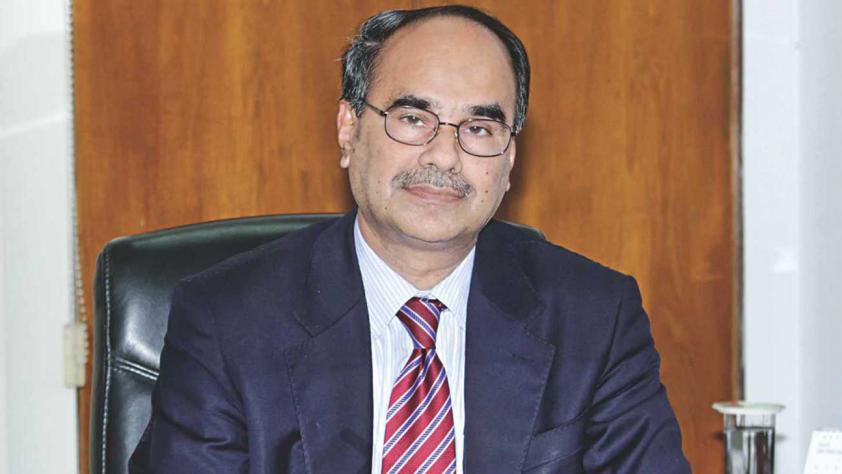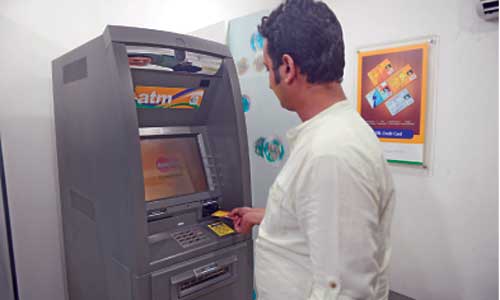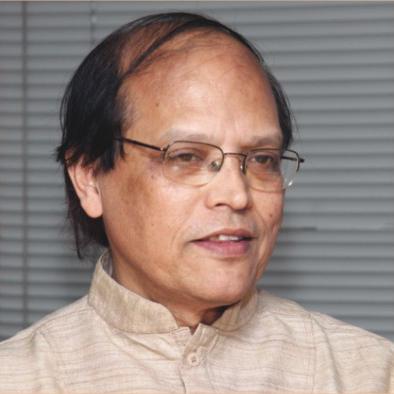Banking
Top brokers seek BB intervention
Raihan M Chowdhury and Mohammad Mufazzal

Top brokers have sought the central bank's intervention and finance minister in two core areas of bank's investments in the capital market to help stabilise the markets, officials said.
In this regard, the brokers urged both the bourses to put forward their demand to the Bangladesh Bank (BB) and the finance minister.
The representatives of top brokers Monday held a meeting with the chairman of the Chittagong Stock Exchange (CSE) Dr Muhammad Abdul Mazid and submitted two proposals.
In their proposals, the brokers have sought the extension of timeframe for adjusting banks' over exposure up to December 31, 2020 from existing deadline set on July 21, 2016.
"There are not adequate depth in the market that can absorb sell pressures worth between BDT 60.0 billion-70.0 billion (6000- 7000 crore) resulting from forced sale/ liquidation of the 'so-called' excess exposure of banks. The deadline, therefore, should be extended at least up to 31st December, 2020," one of the sources was quoted after the meeting.
Another proposal is to exclude banks' equity investments made in subsidiary companies and the investments made in non-listed securities from the bank's exposure limit set at 25 per cent of eligible capital.
The brokers recently submitted same proposals to Dhaka Stock Exchange (DSE) and sought its help in convincing the central bank.
"At Monday's meeting we have been requested to submit the brokers' proposals to the central bank and finance minister. After scrutinising the proposals we will submit these on behalf of the brokers," said Mr. Mazid, the chairman of the CSE.
The managing director of a leading brokerage firm said proper coordination of regulatory bodies is not reflected in the capital market.
"We hope the market will be stabilised if our demands are fulfilled through proper coordination of the regulatory bodies," said the managing director who also attended the Monday's meeting.
At the meeting, the representatives of Al-Arafa Islami Bank, EBL Securities, International Leasing, MTB Securities, NCC Bank Securities and IDLC securities were present.
The meeting was told that BB in 2010 took several measures within a very short time for controlling the 'high tide' of the stock market and instant implementation of those directives adversely affected the stock market.
According to market insiders, as per the Bank Company Act 1991, Banks/NBFIs were allowed to invest 10 per cent of their total liabilities in the stock market. But due to lack of proper monitoring on the part of BB, many banks invested as much as 40 per cent of their total liabilities in the stock market in 2010.
Later in 2013, by amending the Bank Company Act, the allowable investment in stock market was set at 25 per cent of 'eligible' capital (Paid-Up Capital, Share Premium, Statutory Reserve and Retained Earnings).
Market insiders pointed out that due to the amendment, a bank which invested BDT 10.0 billion (1000 crore) in 2010 can now invest only BDT 2.50 billion (250 crore) to BDT 3.0 billion (300 crore) in the stock market.
This amendment has completely stopped stock market participation of banks and also they are under constant pressure from BB to sell-off their shares (even at loss) further deteriorating the market conditions.
The meeting was further told that exposure in stock market is calculated by using all types of securities/ shares (Private, Public, Redeemable Preference and Non-Listed). Only the listed stocks should be treated as exposure because it is not logical to include non-listed companies for calculating the 'capital market' exposure as they are not listed in the stock exchanges.
As per the new rules, banks are directed to reduce their exposure and liquidate excess exposure within 21st July 2016 which created heavy sell pressure in the stock market.
"Initially BB circulars said (DOS circular # 4, in 2010 and DOS circular # 4 in the year 2011) that the subsidiaries' capital will not be considered as capital market exposure of banks. But now Bangladesh Bank includes the subsidiaries' capital as capital market exposure of banks which is contradictory to BB's own circulars," an executive of another top brokerage house said.
On capital market exposure, the meeting was told that the exposure should be calculated on the basis of listed securities in stock exchanges only.
"Companies which are not listed in stock exchanges should be kept out from the exposure calculation," the proposals demanded.
Police handed over the Gold seized in Ctg to Bangladesh Bank

NCC Bank aspires to be at the top
 Golam Hafiz Ahmed
Golam Hafiz Ahmed
Customer satisfaction, financial inclusion and management excellence will be at the heart of NCC Bank's efforts as it aspires to become one of the most beloved commercial banks in four years, its chief executive officer said.
“The environment within the branches will be more customer-friendly in paper work, delivery and care, so they feel comfortable banking with us,” said Golam Hafiz Ahmed.
To make the bank pro-customers, he said, NCC Bank is focusing on building positivity in the attitudes of the frontline workforce.
“If we can satisfy our customers, it will ultimately bring in more clients for the bank.”
To accomplish this goal, NCC Bank has recruited young, talented officers under a new pay scale, which was adopted last year to keep benefits on par with the industry, Ahmed told The Daily Star in an interview last week.
The bank is mapping out a five-year strategy with expansion of the balance sheet and operations, financial inclusion and excellence in total management topping the list of goals, the CEO said.
“We will bring qualitative changes in everything we do. It will eventually increase customer benefit, experience and satisfaction, employees' satisfaction and shareholders' value.”
As a first step, the bank is working on upgrading the system that is needed for large scale operations, he said. It is also working on workforce realignment, he added. “Our plan is to become a top financial institution by 2019.”
Currently, the journey of the bank, now a well-positioned financial institution, to reach a sound position was not smooth at all. Its predecessor was an investment company, riddled with problems. When it became a bank in 1993, it still carried its past ailments.
Owing to dedication from the board, it was able to shed all its past problems in seven years.
“We did not improve overnight. We are still trying to bring in more quality in services and management,” said Ahmed.
The bank's deposits and loans and advancements are growing gradually. In 2014, it had a deposit base of Tk 10,570 crore, up 7.61 percent from 2013 when it was Tk 9,822 crore. Its loans grew to Tk 9,092 crore from Tk 8,816 crore in the same time.
Its non-performing loans went up in the last three years following very low levels of NPLs in 2010 and 2011, when it was 2.27 percent and 2.68 percent respectively.
As of last year, it had NPLs of Tk 673 crore, which was 7.49 percent of total loans. Last year, the bank recorded a profit of Tk 150 crore, which was Tk 113 crore a year ago.
Ahmed pointed at default loans as the biggest hurdle for old banks in the country. “Because of this constraint, we struggle to bring down the lending rates.”
The NPLs for NCC Bank went up a bit this year from last year because of the overall troubled business scenario in the country, which has hit almost all banks, said Ahmed.
He, however, said the bank would reach a comfortable level within two years in terms of NPL, as the bank has an annual target in either recovery or rescheduling worth Tk 300 crore.
With greater focus on tightening risk management, recovering old loans and regularising old accounts, it could not pay attention to propelling the business for higher growth, said the CEO.
“Still, the bank has forayed into new areas for business. And the quality of operational performance and total management has improved, which will be reflected in the financial results at the end of this year.”
Customers are borrowing from other sources as well as external sources at much lower interest rates, he said. “We have to bring down lending rates for the good customers. Of course, we have been doing so all along, providing very competitive rates to good companies.”
The bank has reduced the interest rate for short-term financing and branding itself anew with new products.
With an eye on small and medium enterprises, Ahmed said, “We did not earn very much from our large clients, but our growth in the SME sector is very encouraging. We have exceeded our lending targets for the sector.”
The bank is also involved in agriculture lending and green banking in line with instructions from the central bank, he said. “We are also doing direct lending in the agriculture sector in many districts. Our experience in direct agriculture lending is also good. We have a good base of farmer-borrowers.”
The bank has approved a number of projects under its green banking initiative, as it believes in responsible lending, keeping in mind the environmental impacts and social benefits of lending.
On channelling remittance into the country, it helped migrant workers send Tk 1,870 crore to the country last year.
The bank now has 104 branches employing 2,277 people, and has received permission from the central bank to open another six branches this year.
He said NCC Bank has not gone for the relaxed loan rescheduling facility offered by the central bank; as a lesson from financial felonies in a number of state-run banks in recent years, it has solidified its risk management system.
Ahmed, who is in banking for 31 years now, welcomed the government's decision to reduce the interest rates on its savings instruments; the banks were unable to woo depositors because of the gap in rates between the bank deposit rates and government's savings certificates.
“The new decision will ensure a level playing field.”
Ahmed, who studied economics at Dhaka University, began his career as a senior officer with Pubali Bank in 1983. With just six months, he joined France's Banque Indosuez's Dhaka office where he worked for 13 years. He also worked for Dhaka Bank until he moved to NCC Bank in January 2008 as its deputy managing director. He was appointed as its CEO in February last year.
News:The Daily Star/19-May-2015BB issues dispute management rules for card-based transactions
 A file photo shows a client using an ATM in Dhaka. Bangladesh Bank has issued dispute management rules for inter-bank card-based transactions under National Payment Switch mentioning that they (banks) would have to settle the clients’ claim by six months.
A file photo shows a client using an ATM in Dhaka. Bangladesh Bank has issued dispute management rules for inter-bank card-based transactions under National Payment Switch mentioning that they (banks) would have to settle the clients’ claim by six months.
Bangladesh Bank has issued dispute management rules for inter-bank card-based transactions under National Payment Switch mentioning that they (banks) would have to settle the clients’ claim by six months.
The BB issued separate circular and guidelines to managing directors and chief executive officers of all banks on Thursday asking them to apply to the central bank for settling the dispute if they failed to resolve the problem.
The clients usually face harassment in ATM and PoS transactions when they fail to receive the amount in line with their requirement.
Sometimes, the ATM machines do not provide the required cash although the fund is deducted from the clients’ account with the banks.
The BB guidelines said that the clients would have to submit applications before their account holders’ banks within 60 days after having failed to get their required cash from the ATM or PoS terminal.
The banks will have to resolve the dispute within a few days after submitting the clients’ claim, it said.
The banks, which acquire the debit or credit card of the clients, will have to submit the claim by maximum 25 days to the ATM or PoS terminal holder banks.
After getting the claim, the ATM and PoS machine holder banks will have to resolve the claim by maximum 30 days.
The BB guidelines, however, said the process would have to be completed in the shortest possible time so that the clients would be allowed to get the fund without facing any harassment.
The BB will play role as an arbitrator if the ATM or PoS holder banks deny repaying the claimed fund, the circular said.
The BB will scrutinise video footage from ATM booths along with the banks calculation to settle the dispute if required.
In a few cases, the clients receive partial amount from ATM booths against their requirement.
The banks will go to the central bank to settle such type of dispute on priority basis if they (banks) fail to settle the problem.
The central bank has recently introduced a ‘Dispute Management Software’ with the NPSB so that the banks can easily settle the clients’ claim. All banks, attached with the NBPS, are now allowed to use the software.
The BB guidelines said that the disputes would have to be settled by six months despite the central bank’s intervention as an arbitrator.
Atiur sheds light on BB's role in inclusive growth

Bangladesh Bank has not confined itself to its sole goal of tackling inflation and is rather addressing risks of instabilities and imbalances through inclusive and environmentally sustainable institutional ethos in financing, its governor said.
Atiur Rahman said BB has deliberately shunned the minimalist orthodoxy of inflation targeting as the sole legitimate objective of the central banking.
“Last decade's global financial crisis has proven this minimalist orthodoxy deficient even for developed economies, but the unconventional approaches of developed economy central banks still go no further than monetary loosening by quantitative easing, in effect sowing seeds of further imbalances, future instabilities and crises.”
“BB and a number of other developing economy central banks have instead been trying to address the risks of instabilities and imbalances at sources, by promoting socially responsible inclusive and environmentally sustainable institutional ethos in financing,” he said.
Rahman spoke at an international seminar on 'Challenges of price stability, growth and employment in Bangladesh: Role of Bangladesh Bank' in Dhaka on Thursday.
Bangladesh Bank and the International Labour Organisation (ILO) organised the event.
In recent years, the BB has widened its developmental role of playing its part in the national strategy of inclusive growth and is seeking to model itself as a developmental central bank.
Bangladesh is cited among the very few countries where the central bank has an explicit development objective.
Rahman, who promoted pro-poor and SME financing since taking the helm of the central bank in 2009, said BB's sustained motivation, enablement and policy support efforts in promoting inclusive and green financing are paying off well for the Bangladesh economy, in terms of sustained stable 6-plus percent real annual GDP growth spell for well over 12 years now amid persistent global growth slowdown, with stable downtrend in inflation.
“The inclusive quality of Bangladesh's stable, steady growth is evidenced by rapid poverty decline with buoyant, vibrant employment growth in the rural economy supported by inclusive micro, small and medium enterprise financing of farm and off farm output activities.”
“Attention to adequacy of financing for crops, vegetables, dairy, poultry and fishery has yielded substantial output gains in these areas, including self sufficiency in rice and exportable surplus in many agricultural produces.”
The governor said because of the inclusive stance of financing promoted by BB, SMEs and other start-up businesses in Bangladesh faced no credit crunch during or following the global financial crisis.
He said Bangladesh's entire financial sector is now fully on board with BB in mainstreaming inclusive and environmentally responsible financing in the financial sector.
Rahman thanked all development partners for coming forward in extending policy support for SME and green financing with low-cost refinance lines for BB.
At the seminar, Muhammed Muqtada of the ILO presented a study on the role of the central bank in tackling challenges of price stability, growth and employment in Bangladesh.
The study said BB has adequate reasons to engage in multiple mandates, especially in financial structure development and financial inclusion initiatives.
These, apart from serving the national strategy of social inclusion, could potentially lead to strengthening and deepening of the financial sector and, hence, support price stability, according to the study.
With respect to price stability, BB is trying to bring the inflation rate down further through credit channels.
The study contends that BB has an “imprecise control” over price stability owing to weak transmission mechanisms.
Also, its existing instruments have a limited capacity to address volatile food inflation that weighs heavily on general inflation.
“Given the BB's mandates, it would be necessary for it to design a middle- to long-term strategy to strengthen its existing policy stance, and to initiate policies that would allow greater play and effectiveness of its instruments.”
The ILO study advises the central bank to avoid being fetish about a strict adherence to low inflation targets warranting sharp contractionary monetary measures, as the existing monetary policy is likely to be challenged if the economy were to follow the predicted growth path to Vision 2021.
“Greater opening up of the economy and future financial liberalisation would require BB to enforce greater integration of financial market segments and market resilience to avoid disruptions in price and exchange rate stability. The strategy would require more attention to strengthening and accommodation of the increasing importance of the policy rate and exchange rate channels.”
The study also said a well-functioning financial sector would require not only increasing the size of the sector, but also developing secondary markets for securities that would control interbank rates and transactions.
There needs to be a review to assess the real employment and effects of the financial inclusion initiatives, and their sustainability.
“Strengthening and support to mobile banking, automations in payment systems, agent banking, and designing of confidence-building regulations and guidelines could act as an important catalyst towards standardising commercial banking across the country, rural or urban.”
News:The Daily Star/18-May-2015


